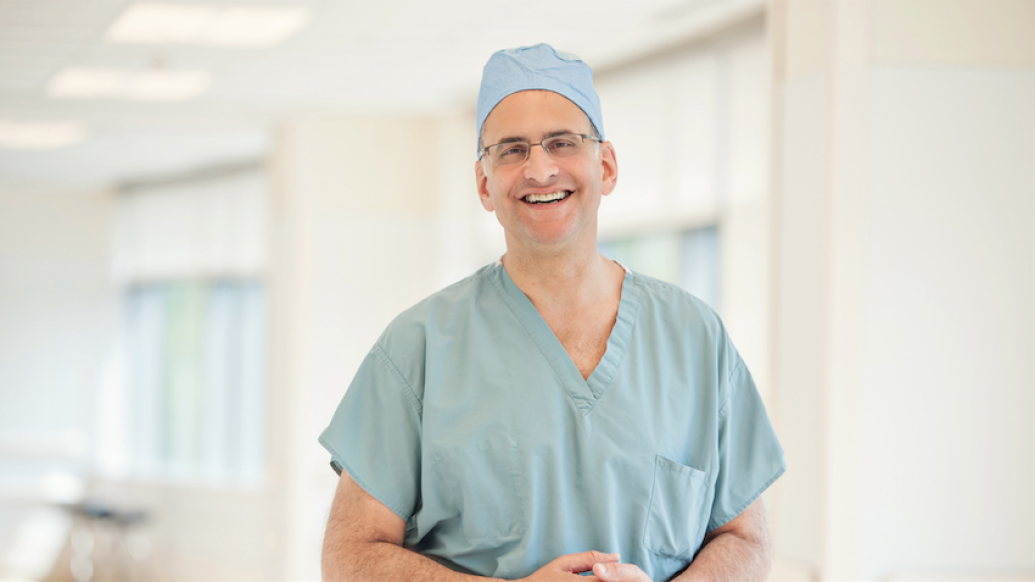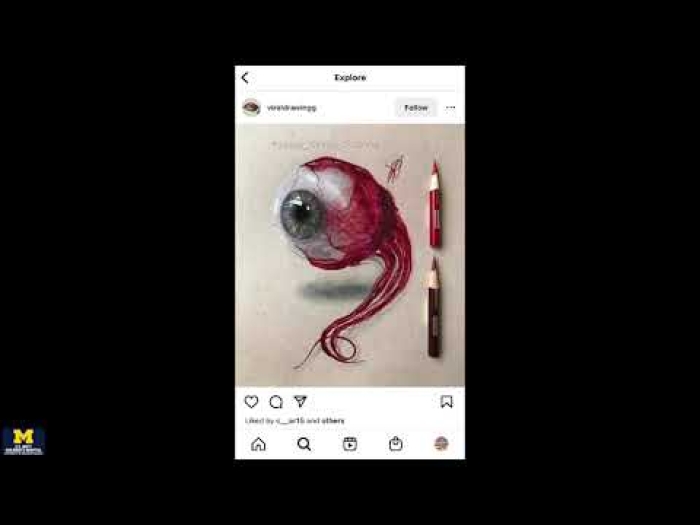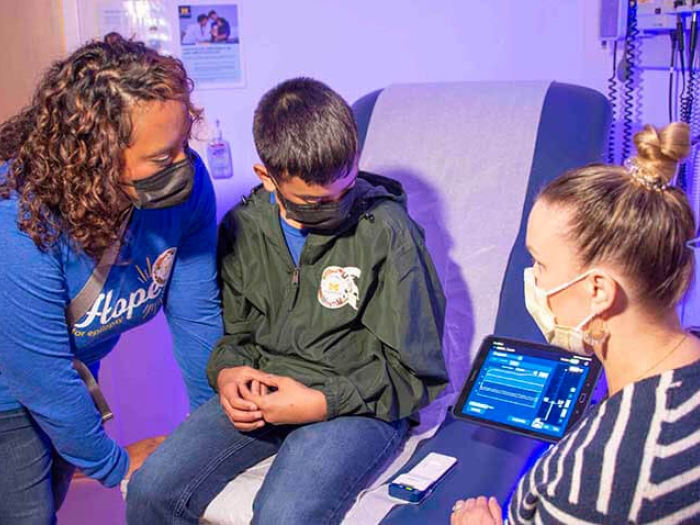In the wake of Mott pediatric surgeon Daniel H. Teitelbaum’s death from a brain tumor, one mom remembers his enormous impact.
1:00 PM
Author |

We've been on this journey over six years now. My daughter, Faith, has a rare intestinal disease, hypoganglionosis, which gives her intense stomach pain, as well as trouble eating, using the bathroom and absorbing nutrients.
Our journey has been filled with the darkest days of my life, but we've also been blessed with the most amazing people God could have ever chosen to accompany us. Recently, one of those people left us. He's the person I tell people saved my Faith.
So, while I know this loss is inconceivably hard to his family, friends and colleagues, I will do my best to tell you what the loss of Dr. Daniel H. Teitelbaum means to us, a family who was blessed with his brilliant mind, masterful care and thoughtful education.
It would be easy for me to ask why and how something like this could happen.
It's unbelievably hard not to angrily question how someone like this man, who prevented the suffering and death of children, could be taken from us. But when I think about Dr. Teitelbaum and the way he was, I know that he would want me to concentrate not on his death, but on his life, how he chose to live, and how we can learn from him.
Faith's case is complicated. And from the beginning, Dr. Newman, one of our other pediatric surgeons, told us about this amazing doctor who worked at the University of Michigan C.S. Mott Children's Hospital and specialized in the care of diseases like Faith's. She said he was one of the best in the nation. In fact, she may have said he was the best, and after years of working with him and meeting many of his colleagues around the nation, I'd have to say she was right. He was the best.
That may seem like a bit of an inflammatory statement. But I assure you, it is not. It is the same opinion held by countless other mothers of children who have been cared for by him. Here's why.
6 lessons from Dr. Teitelbaum
When we first met Dr. Teitelbaum, he wanted to know everything. With his hand on his face, he would sit back and listen to every word we said. He always really listened. He rushed nothing, and he would hear every word. As a parent, you worry that you will tell them all that they need to know, that you will tell them enough, that you won't leave out an important detail. With Dr. Teitelbaum, that was never a worry because there was never a rush.
From him we can learn to listen.
As time passed, I learned something from Dr. Teitelbaum that surprised me. I learned that while I wanted the doctors on Faith's team to be confident, it was extremely important to me that they were humble. The saying "you only know what you don't know?" Well, Dr. Teitelbaum never answered a question he didn't know the answer to. Maybe that seems like an obvious statement, but it's not. If there isn't an answer, and it's just your opinion, I want to know that. He was always looking things up on his phone, or getting back with me after he had done some research. Sometimes he would call his colleague from the other side of the world to get his opinion on Faith.
From him we can learn to be humble.
When you have someone who is willing to tell you they don't know the answer to every question you have, but will find an answer, it builds trust. When you have a child with a chronic illness, sometimes you try things that work well, and sometimes things don't. There is an art to medicine; it is not always cut and dried.
Dr. Teitelbaum built trust with Faith, and he built trust with our family. I always trusted his opinions and always felt assured after talking to him that Faith was in the most capable hands. When he left the room, I always felt like we had a plan and it was one we could live with. I trusted him.
From him we learn to build trust.
I can tell you when you have a rare disease, your health care team literally works around the clock for you. Sending photos and questions happens more often than I would like. The great thing is having a doctor who will answer your question at 2 a.m. — what a reassurance.
What was also reassuring was that he wanted to learn more and more. He would come into the room and say, "I was reading this study and I wanted to go over it with you." Then he would open up a medical journal and read a study with us. Many doctors would give us the results without explaining how they came up with them, but Dr. Teitelbaum understood that as Faith's mom, I was his most important student about her disease, and he challenged me to understand what I was reading.
Dr. Teitelbaum wasn't practicing medicine for the last year of his life, so it's been a while since we've seen him. But he would be happy to know that I've kept up with reading the medical journals and studies that he taught me about. Parents who want to know everything there is to know do not make doctors' jobs easier. In fact, I can be a pain in their side. But Dr. Teitelbaum taught me that learning to learn was one of my most important jobs as Faith's mom.
From him we can learn to learn.
Our first week in-house at Mott was tricky. I took to Facebook to ask what a resident and attending doctor even meant. Quickly, I learned the ranks, but something I respected so much about Dr. Teitelbaum is the way he taught. He would speak with the same respect to a first-year medical student as he would his fellow attending physicians. His style of teaching was all-inclusive, and he involved Faith as much as he could. One day, when he left rounds in our room, my teacher girlfriend said to me, "I think I just got the best lesson in education in my entire life," and I believe her. His teaching style is one of the things about him that can never be replaced, but will be carried on by his students.
From him we learn to teach.
The last thing I want you to know about this man we will miss so much involves a story.
When Faith was six, it was determined that her colostomy bag alone wasn't doing the job, and her entire colon would have to be resected. It was a scary surgery as they had to also do some work on arteries that supplied the blood to her lower part of her body. I handed her off in the care of Dr. Newman and Dr. Teitelbaum. They thought it could take as much as six hours to complete. Faith was an expert at the OR at this point and didn't need the pre-med to go back to the OR. As they wheeled her away, I listened to her talk to her doctors.
Three hours later, we received a page. The doctors wanted to meet with Faith's dad and I in the consultation room. I remember looking at each other scared out of our minds that it went so fast something had to have gone terribly wrong. When we got to the room, Dr. Teitelbaum pulled out his phone and said, "I want to show you something."
I gasped for air and then looked at the smile on his face. Something wasn't wrong — he was beaming with a smile from ear to ear.
He showed us a video he had taken of Faith singing in the OR just before she had her surgery. She sang to him about going bowling with her colon with a big smile and lots of dramatic hand gestures. She understood how serious this surgery was, but she trusted her team that much! She took the time to make up a song for them — apparently a first for him because he was pretty excited about it. He asked our permission to share the video and said it had a great impact on him.
He then shared that the surgery was a success and she was doing fantastic — but I loved what he couldn't wait to share with us was the video; not to tell us about how amazing they were in the OR, but how amazing our daughter was to him.
Dr. Teitelbaum knew he was leaving us and made sure that his patients were going to be well taken care of in his absence. I truly believe there is no replacing this man, but I know Faith is in very capable hands. I fear the day I have something new come up and the reality of him being gone takes my breath away like it did when I first heard about his illness.
I mourn the fact that his brilliant mind isn't working on curing Faith's disease. I will miss seeing him and having him watch Faith grow. I tried really hard to reach out to him once I heard about his diagnosis to thank him for everything he had done for Faith, but how do you thank someone for giving life when they are losing theirs?
Luckily, I have strong spiritual faith that this man now knows exactly how strongly I felt about him and what he has done for our family.
When I told Faith that Dr. Teitelbaum had died, she was pretty hysterical. Worse than I had expected because we knew he was going to die. Once she had calmed down, I asked her what about it made her so sad and she said, "I just know he really loved me mom, and I really loved him."
From him we learn love.
This blog was originally published at Mary Ann's blog about Faith's illness, myfaithsjourney.com. A fund has been established in honor of Dr. Teitelbaum to ensure his legacy lives on for years to come. Contributions can be made here.

Explore a variety of healthcare news & stories by visiting the Health Lab home page for more articles.

Department of Communication at Michigan Medicine
Want top health & research news weekly? Sign up for Health Lab’s newsletters today!





